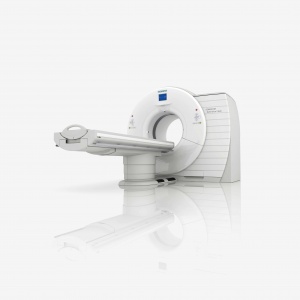
December 7th, 2008 by Dr. Val Jones in Audio, Expert Interviews
Tags: 2008 National Health Leadership Patient Safety Leadership Award, Detroit, Dr. Val Jones, Healthcare Quality, Henry Ford, Henry Ford Health System, Hospital, Nancy Schlichting, National Press Club, Quality
No Comments »
 |
|
Nancy Schlichting
|
“Detroit is the poorest city in America. But we’re not going to be victims of circumstance. We’re going to rise up and lead the country in healthcare quality and become part of the economic solution for our community. The Henry Ford hospital name must mean something when people drive up to it.”
– Nancy Schlichting, President and CEO, The Henry Ford Health System, Detroit, Michigan
I sheepishly admit to being surprised that a hospital system in Detroit was singled out for a national award for hospital quality and safety. Who would think that the poorest city in America could be a beacon of light in these dark times in healthcare? The story of Henry Ford Health System, and its female president and CEO, Nancy Schlichting, is both inspirational and motivational. I had the chance to interview Nancy at a recent award ceremony at the National Press Club where she received the 2008 National Health System Patient Safety Leadership Award.
You may enjoy our conversation via podcast, but please forgive the “tinny” sound quality. I recorded our conversation with a little hand-held digital device instead of my usual recorded phone line.
[Audio:http://blog.getbetterhealth.com/wp-content/uploads/2008/12/nancyschlichting.mp3]
Dr. Val: Congratulations on winning the National Health System Patient Safety Leadership Award. Has improving patient safety at your hospital been a challenge?
Schlichting: On a given day, a patient may encounter up to 50 different hospital employees. Coordinating our efforts so that the patient’s experience is consistently positive and error-free is certainly challenging.
We have 7 pillars of performance at Henry Ford, and the first is “people.” We like to say that we “have to take care of the people who are taking care of people.” We need to make sure that they have the resources they need, that the processes are in place so they can do their jobs well, and that they get their individual needs met. For example, everyone knows my email address and they can contact me at any time if they’re not getting their problems resolved. I respond to every single email. This creates a culture of openness and responsibility. They know that the person at the top cares about them.
Dr. Val: A prominent community member experienced an unfortunate lapse in communication during his hospital stay, which resulted in compromise of his care, and he eventually died in the hospital. You personally met with his wife and promised her that you’d take the necessary steps to ensure that this never happened again. Tell me more about that.
Read more »
November 25th, 2008 by Dr. Val Jones in Audio, Expert Interviews
Tags: Dangers, Dr. Brian Fennerty, Dr. Val Jones, Fecal Transplant, Fecal Transplantation, Gastroenterology, Grey's Anatomy, Intestinal Flora, Podcast, Probiotics, Unhealthy
7 Comments »

Photo Credit: authenticmaya.com
The blogosphere has been buzzing lately about the idea of “fecal transplants,” probably because this treatment (first studied in the 80’s) was recently mentioned on Grey’s Anatomy. Proponents of the therapy (which involves the introduction of donor stool into a patient via enema or naso-gastric tube) say that it can rejuvenate intestinal flora and cure c. diff colitis, and various inflammatory bowel disorders. I had my doubts about these claims and decided to interview gastroenterologist Dr. Brian Fennerty to get to the bottom (sorry abou the bad pun) of this issue.
Dr. Fennerty is a Professor of Medicine in the Division of Gastroenterology at Oregon Health & Science University in Portland, Oregon, where he also serves as Section Chief of Gastroenterology.
Listen to the podcast here:
[Audio:http://blog.getbetterhealth.com/wp-content/uploads/2008/11/brianfennertyfecallq.mp3]
Dr. Val: What exactly is a “fecal transplant?”
Dr. Fennerty: First, by way of background, you need to understand that the GI tract is populated with thousands of varieties of “good” bacteria that are essential for our health. If we didn’t have bacteria in our colon and small intestine, we would die. Fecal transplantation is the repopulation of a person’s gut bacteria (flora) with fecal matter from somebody else. Some argue that this helps to treat certain diseases.
Dr. Val: How is this procedure performed?
Dr. Fennerty: As it was originally described, fecal transplantation involved removing the undigested food particles from the stool sample of a “healthy” person, and then spinning it so that a pellet (of hundreds of thousands of species and quasi-species of bacteria) remains. The pellet is then introduced to the patient through a nasogastric tube into the small intestine, or the pellet can be resuspended in liquid and introduced into the rectum via an enema. The idea is that the bacteria will colonize the patient’s colon and squeeze out the bad bacteria that are in there.
Dr. Val: What are fecal transplants purported to do?
Read more »
November 24th, 2008 by Dr. Val Jones in Audio, News
Tags: Andre Hartung, CT, CT Scanner, Dr. Val Jones, Dual Source, Fast, Gene Ostrovsky, Imaging, MRI, Radiology, Siemens, Somatom Definition Flash Dual Source CT Scanner
1 Comment »
I really like new technology, especially when it offers a very obvious advantage for patients. I recently heard about a new CT scanner that is so fast, it dramatically reduces radiation exposure for patients and can take crisp images of moving organs (like the heart). I asked to speak with Siemens’ VP of Sales and Marketing, Dr. André Hartung, to find out about the new Somatom Definition Flash Dual Source CT Scanner (it takes longer to say the machine’s name than to scan your entire body). Of course, I invited my Medgadget friend, Gene Ostrovsky, to join the call. I’ve included a “bonus track” for more advanced readers at the end of this blog post. Enjoy!
Listen to the podcast here:
[audio:http://blog.getbetterhealth.com/wp-content/uploads/2008/11/andrehartunglowq1.mp3]
Dr. Val: Just to set the stage for our listeners – can you explain what a CT scanner is, and how it differs from an MRI?
Hartung: Both CT scanners and MRI machines allow healthcare professionals to look inside the human body for diagnostic purposes. While CT scanners use x-rays to produce images, MRI machines use magnets. CT Scanners are very fast and widely available – almost every hospital has one.
Dr. Val: When would a doctor want to use a CT scanner instead of an MRI machine?
Hartung: CT images are especially good at detecting cancer. Also, because CT scans can be done so quickly, they are also useful diagnostic tools for stroke, heart attack, or when a patient is in critical condition – when every second counts.
Dr. Val: You said that CT scans are based on x-ray technology. How much radiation exposure does the average CT scan cause?
Read more »
November 20th, 2008 by Dr. Val Jones in Audio, Celebrity Interviews
Tags: Bedside Briefings, bedsidebriefings.com, Debi Mazar, Dr. Val Jones, Entourage, Goodfellas, Insomnia, Sleep, sleep deprivation
3 Comments »
 |
|
Debi Mazar
|
You may know actor Debi Mazar from her work in the movie Goodfellas, and from her role as Shauna on the HBO hit TV show, Entourage. But I know Debi as a busy mom who struggles with insomnia. I caught up with her a few days ago to find out how she’s coped with those sleepless nights.
Listen to the podcast here:
[audio:http://blog.getbetterhealth.com/wp-content/uploads/2008/11/debimazar.mp3]
Dr. Val: When did insomnia first become a problem for you?
Mazar: Insomnia is surprisingly common. It affects 60 million Americans: 40% of women and 30% of men. My struggle with insomnia began in my mid to late 20’s when my professional and love life went into full swing. I ate well and exercised, but started having trouble falling asleep every night. I went to see a doctor because I didn’t realize that there were many things that I could do about it on my own.
Dr. Val: What are some of the non-medical treatments that worked for you?
Mazar: Cutting back on caffeine, sugar, and alcohol, and exercising only early in the day, having a healthy sex life, and getting myself on a sleeping schedule. I also tried to reduce stress levels in my life by not going to bed angry, by unplugging from TV and the Internet, and I made my bedroom a very cozy, dark environment that would be condusive to sleep. When you’re a mom, sleeping pills aren’t a good option because you might have to get up in the middle of the night. I have a full list of insomnia tips at bedsidebriefings.com
Dr. Val: I bet that insomnia is a common problem in Hollywood. Has that been your experience?
Mazar: I don’t consider myself to be part of “Hollywood” I’m just an average mom who worries about the world we live in and our economy. The news can cause a lot of anxiety – regardless of what you do for a living. It keeps us all awake at night. Of course, chronic insomnia can increase our risk of depression, weight gain, diabetes and hypertension.
Dr. Val: What is the most important thing for Americans to know about sleep?
Mazar: Sleep is the time when your body repairs itself, so sleep is essential for good health. Without it, we all fall apart.
November 12th, 2008 by Dr. Val Jones in Audio, Expert Interviews
Tags: ADA, Corn Syrup, Dr. Val Jones, Evidence Based Nutrition, Fat Burning, Fish Oil, Food and Nutrition, Magic, Nutrition, Omega-3 Fatty Acids, Penny Kris-Etherton, Podcast, Supplements, Weight Loss
1 Comment »
Penny Kris-Etherton, Ph.D., R.D., Distinguished Professor of Nutrition (Department of Nutritional Sciences, Penn State University) about what she learned at the American Dietetic Association Food & Nutrition Conference & Expo in Chicago.
Please listen to the podcast here: [audio:http://blog.getbetterhealth.com/wp-content/uploads/2008/11/pennykrisetherton.mp3]
Penny’s take home messages:
1. Corn is not evil. The vegetable itself can be quite nutritious, though high fructose corn syrup is an empty calorie food additive.
2. There is no magic food that will melt your fat away.
3. There is no magic pill that will help you lose weight. You must decrease your calorie intake and increase your exercise.
4. Increasing protein a little bit can increase satiety.
5. Omega-3 fatty acids and iron can improve brain health.
6. Regular fatty fish consumption can reduce the risk of heart disease (2 servings/week).
7. Food first – try to get all your nutrients from the foods you consume. Consider vitamins and supplements only after you’ve been unable to get your dietary needs met from food.
8. Fish oil supplements are safe and pure. There are differences in the amount of omega-3 fatty acids that the supplements deliver, so read the label carefully.
9. A healthy diet is about eating a broad range of nutritious food (don’t scrimp on your veggies), it’s not about supplementing a poor diet with some supplements.
10. Accurate nutrition information is really important. Two trusted sources are: MyPyramid.gov and the American Heart Association
**Listen to the podcast**
















